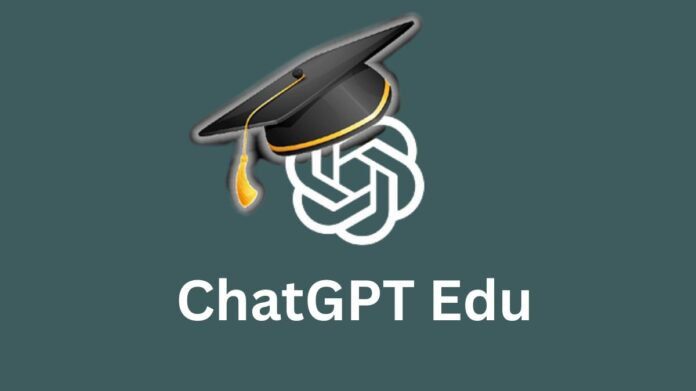Introducing ChatGPT Edu, a version of ChatGPT designed to help academic institutions properly implement AI for researchers, students, professors, and campus operations. ChatGPT Edu, powered by GPT‑4o, can employ sophisticated techniques like data analysis and reason across text and vision. This new product is reasonably priced for educational organizations and comes with enterprise-level protection and controls.
In created ChatGPT Edu after observing the success that ChatGPT Enterprise was having at universities like Columbia University in the City of New York, the University of Oxford, the University of Texas at Austin, Arizona State University, and the Wharton School of the University of Pennsylvania (opens in a new window).
How campuses use ChatGPT today
ChatGPT may aid with a number of campus-wide tasks, including helping researchers prepare grant applications, checking resumes and offering individualized coaching to students, and helping professors with grading and feedback. It academic partners have come up with creative ways to make AI available to researchers, students, faculty, and campus operations. Here are several examples:
- Columbia University professor Nabila El-Bassel is spearheading a project to incorporate AI into neighborhood-based tactics to lower the number of overdose deaths(opens in a new window). Her team created a GPT that cuts weeks of research into seconds by analyzing and synthesizing big datasets to inform treatments.
- Through conversations with a GPT trained on the course topics, undergraduate and graduate students enrolled in Professor Ethan Mollick’s courses at Wharton completed their final reflection projects. They reported that ChatGPT helped them reflect more deeply on their learning.
- An assistant professor at Arizona State University named Christiane Reves is creating a personalized Language Buddies GPT that will allow students to converse in German at their own level and get personalized feedback. In addition to saving faculty time on evaluations, the GPT will assist students in developing their communication abilities.
Bringing AI into the new school year
In created ChatGPT Edu as an approachable way for colleges to implement AI on campus in order to expand on these applications.
Included in ChatGPT Edu are:
- Access to flagship model, GPT-4o, which excels in mathematics, coding, and text interpretation
- Advanced features including document summarizing, web browsing, and data analytics
- The capability to create GPTs and personalized ChatGPT versions and distribute them throughout academic workspaces
- Considerably greater message restrictions than ChatGPT’s free version
- More than 50 languages are available, and language skills have improved in both quality and speed.
- Strong data privacy, security, and administrative measures like SCIM 1, SSO, group rights, and GPT management
- OpenAI models are not trained using data or conversations.
What features does ChatGPT Edu?
- GPT-4o is accessible through ChatGPT Edu, which also offers the following features:
- Advanced tools include file uploads, online browsing, and data analysis.
- The capability to create GPTs and personalized ChatGPT versions and distribute them throughout academic workspaces
- Message restrictions that are significantly greater than ChatGPT Free
- More than 50 languages are available, and language skills have improved in both quality and speed.
- Strong data privacy, security, and administrative measures like SSO, GPT management, group rights, and SCIM
What security and privacy controls does ChatGPT Edu offer?
In ChatGPT Enterprise, you are the owner and manager of your company’s data. ChatGPT Edu models don’t learn from your usage, and its don’t train on your business data or chats. All chats are encrypted both in transit and at rest, and ChatGPT Enterprise complies with SOC2. Large-scale enterprise deployment is made possible by new admin console, which provides domain verification, SSO, and use data in addition to easy team member management.

